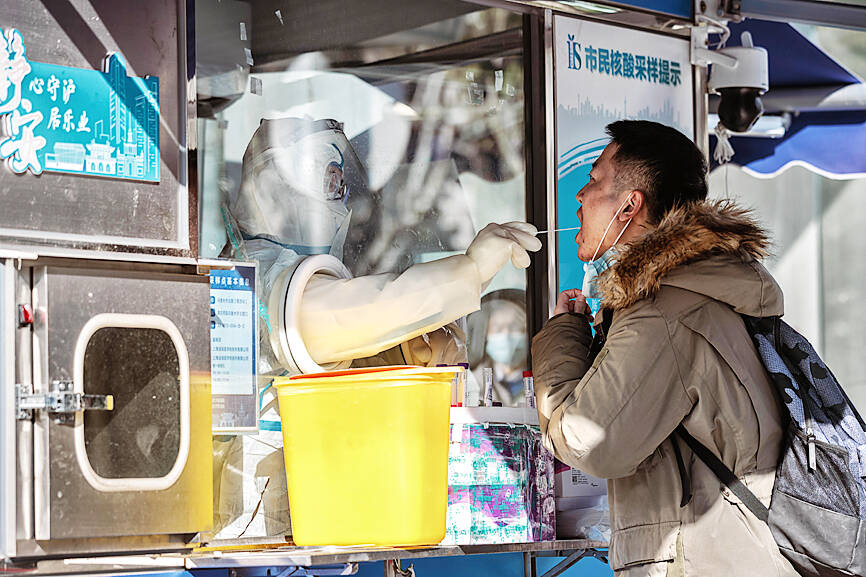Crematoriums across China are straining to deal with an influx of bodies as the country battles a wave of COVID-19 cases that authorities have said is impossible to track.
Cases are soaring across China, with hospitals struggling and pharmacy shelves stripped bare.
From the country’s northeast to its southwest, crematorium workers told reporters that they are struggling to keep up with a surge in deaths.

Photo: EPA-EFE
In Chongqing — a city of 30 million people where authorities this week urged people with mild COVID-19 symptoms to go to work — one worker said that their crematorium had run out of space to keep bodies.
“The number of bodies picked up in recent days is many times more than previously,” said the staffer, who did not give their name.
“We are very busy, there is no more cold-storage space for bodies,” they said. “We are not sure [if it’s related to COVID-19], you need to ask the leaders in charge.”
In Guangzhou, an employee at one crematorium in Zengcheng District said that they were cremating more than 30 bodies a day.
“We have bodies assigned to us from other districts. There’s no other option,” the employee said.
Another crematorium in the city said that it was also “extremely busy.”
“It’s three or four times busier than in previous years, we are cremating over 40 bodies per day when before it was only a dozen or so,” a staffer said.
“The whole of Guangzhou is like this,” they said, adding that it was “hard to say” whether the surge in bodies was linked to the virus.
In Shenyang, a staff member at a funeral services business said that bodies were being left unburied for up to five days because crematoriums are “absolutely packed.”
Asked whether the rise in demand was due to COVID-19, he said: “What do you think? I’ve never known a year like this one.”
The end to mandatory testing has made the toll of China’s COVID-19 surge difficult to track, with authorities last week saying it is now “impossible” to tally how many have fallen sick.
Beijing health officials yesterday said that only those who had directly died of respiratory failure caused by the virus would be counted under COVID-19 death statistics.

Right-wing political scientist Laura Fernandez on Sunday won Costa Rica’s presidential election by a landslide, after promising to crack down on rising violence linked to the cocaine trade. Fernandez’s nearest rival, economist Alvaro Ramos, conceded defeat as results showed the ruling party far exceeding the threshold of 40 percent needed to avoid a runoff. With 94 percent of polling stations counted, the political heir of outgoing Costa Rican President Rodrigo Chaves had captured 48.3 percent of the vote compared with Ramos’ 33.4 percent, the Supreme Electoral Tribunal said. As soon as the first results were announced, members of Fernandez’s Sovereign People’s Party

EMERGING FIELDS: The Chinese president said that the two countries would explore cooperation in green technology, the digital economy and artificial intelligence Chinese President Xi Jinping (習近平) yesterday called for an “equal and orderly multipolar world” in the face of “unilateral bullying,” in an apparent jab at the US. Xi was speaking during talks in Beijing with Uruguayan President Yamandu Orsi, the first South American leader to visit China since US special forces captured then-Venezuelan president Nicolas Maduro last month — an operation that Beijing condemned as a violation of sovereignty. Orsi follows a slew of leaders to have visited China seeking to boost ties with the world’s second-largest economy to hedge against US President Donald Trump’s increasingly unpredictable administration. “The international situation is fraught

MORE RESPONSIBILITY: Draftees would be expected to fight alongside professional soldiers, likely requiring the transformation of some training brigades into combat units The armed forces are to start incorporating new conscripts into combined arms brigades this year to enhance combat readiness, the Executive Yuan’s latest policy report said. The new policy would affect Taiwanese men entering the military for their compulsory service, which was extended to one year under reforms by then-president Tsai Ing-wen (蔡英文) in 2022. The conscripts would be trained to operate machine guns, uncrewed aerial vehicles, anti-tank guided missile launchers and Stinger air defense systems, the report said, adding that the basic training would be lengthened to eight weeks. After basic training, conscripts would be sorted into infantry battalions that would take

GROWING AMBITIONS: The scale and tempo of the operations show that the Strait has become the core theater for China to expand its security interests, the report said Chinese military aircraft incursions around Taiwan have surged nearly 15-fold over the past five years, according to a report released yesterday by the Democratic Progressive Party’s (DPP) Department of China Affairs. Sorties in the Taiwan Strait were previously irregular, totaling 380 in 2020, but have since evolved into routine operations, the report showed. “This demonstrates that the Taiwan Strait has become both the starting point and testing ground for Beijing’s expansionist ambitions,” it said. Driven by military expansionism, China is systematically pursuing actions aimed at altering the regional “status quo,” the department said, adding that Taiwan represents the most critical link in China’s